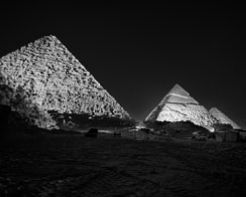 |
||
Luca Campigotto
Night memory
One evening, as the Giza fence was closing, I found myself beyond the mastabas that stand beside the pyramid of Mycerinus, at the furthest point from the exit.
I hurriedly fumbled with my camera and tripod, when one of the many so-called guides that wander around the enormous open space came up to me, asking if I wanted to stay for the laser show —obviously without paying for the normal ticket. A couple of dollars of baksheesh would be enough to keep me hidden from the guards.
I was tired and wanted to go back to my hotel. I wasn’t interested in seeing bands of coloured light projected onto the pyramids, but his manner was intriguing so I accepted. I was taken to a particularly hidden corner and told to wait.
While I was sitting there—savouring the satisfaction of the travelling photographer at rest—it got dark, very dark. After half an hour I started thinking that the laser show was just an excuse; maybe a gang of prowlers was going to creep up on me from behind: goodbye money and camera.
Distrustful and a bit nervous, I got up to try to explore the surrounding darkness. I then realised I was on the edge of a cliff. Below me in the desert that laps Cairo was the extraordinary sight of a camp: fires, camels, horses and small groups of men squatting and chatting. An unforgettable view. A staging rehearsed for centuries.
The sight calmed my fears; I went back to sit on the ancient rock I had chosen and kept waiting.
The show was a succession of very fast lasers. The light changed continuously and I couldn’t manage to frame the scene before it had completely changed. I moved here and there, shot, reloaded, picked up the film magazine fallen in the sand, cursed. The slow and slightly ceremonious approach I like to use when shooting contrasted with the frequency of the flashes. But I did manage to photograph the pyramids bathed in light. The show finished and everything was plunged back into darkness.
At this point, my guide puts out his hand for his tip and with the other points out the path to the exit. Gaping incredulously, I tell him it is out of the question. I won’t even dream of paying him if he doesn’t get me out of there. I certainly don’t want to end up in the clutches of the guard patrols.
He hesitates, then shakes his head firmly to say he can’t come because it would be too risky. And I, unwavering, repeat to him – half in English, half in Venetian dialect – that he had made me stay there and now he would get me out. Finally, with the fear that his miserable baksheesh is about to vanish, he agrees to accompany me, indicating that I should put away the camera and fold up the tripod. Because we will have to run.
There and then I didn’t realise that an unbelievable dash was about to begin. And so, here I am—tripod and shoulder bag—running in the dark, tripping every three steps, while I struggle to keep my scout’s galabiya in view as he scampers off in his plastic sandals. A magnificent race from another time, across the dark open space around the great pyramids: two twopenny-halfpenny tomb robbers furtively running away between majestic forms like space ships.
As in every respectable getaway, we keep stopping suddenly to flatten ourselves behind a rock. A couple of times we end up stretched out on the ground, almost holding our breath while the camel patrol passes right by us. An Arabic murmur fades into the dark air as we get up and start running again. I’m fairly awkward, with my weights and disorientation, and he’s not particularly agile, either, in his long galabiya with wide stripes – running at breakneck speed from Mycerinus to Khefren, toward the exit near Cheops.
Every now and then my accomplice, with his razor-sharp eyes and ears, warns that the police are coming—on camel, on horseback—and orders me with curt gestures to run faster, stay down, stay back.
I once again find myself with my face resting on the sand, like a boy playing cops and robbers, in Egypt. If at that moment someone who knew me could see me, what would they say? But in the end, who knows what would happen if a policeman should find a tourist wandering illegally around the pyramids at night? So better to keep on running. Corto and his friend Rasputin are also running in front of me, along with Douglas Fairbanks and Errol Flynn, escaped from an old Hollywood costume movie.
By now we have almost made it, we are near the exit. The illuminated street with its comings and goings is already visible below us when, from the darkest corner, a voice breaks the silence, calling on us to stop in the language of the Prophet.
It was just a moment, not even time to start worrying, and my guide was already bargaining with the guy hidden in the shadows – one of his colleagues perhaps—who was immediately prepared to let us past in exchange for a percentage of the agreed tip.
Then, finally on the street, in the smoky chaos of a bar, we celebrate our narrow escape with a fruit juice. My friend is solicitous: ‘Laser show good? Good pictures?’. I tell him I will always remember the excitement of our illegal run. He laughs. ‘Next time, for ten dollars you can stay in the camp, and at dawn I’ll take you to climb Mycerinus to see the sunrise’.
From The Stones of Cairo, Peliti Associati, Rome 2007